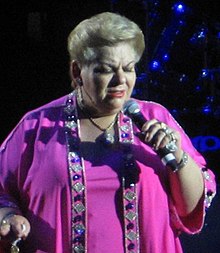Paquita la del Barrio
Paquita la del Barrio , actually Francisca Viveros Barradas (born April 2, 1947 in Alto Lucero , Veracruz ), is a Mexican singer in the field of ranchera and other traditional Mexican music styles.
Life
Francisca Viveros began to sing publicly on the street at the age of twelve. Word of her talent spread quickly, so teachers occasionally asked her to perform at school celebrations. She left school as early as possible and started her first job in a registry office at the age of 15. There she fell in love with her boss, Miguel Gerardo, who was around 30 years older and from whom she had two sons. However, they did not lead a regular family life because Gerardo was otherwise married. As a result, the relationship finally fell apart and Viveros moved with her mother and children.
Because she promised herself a better life in the capital, she moved to Mexico City in 1970 , where she soon afterwards had her first public appearance with her sister Viola at a party. From then on they appeared together at every opportunity presented as a duo under the name Las Golondrinas (dt. The Swallows ). Because of their limited financial means, they lived in Tepito at the time , one of the most dangerous and socially disadvantaged areas in the Mexican capital.
At one of her next jobs, she met her future husband Alfonso Martínez, the manager of a hotel restaurant. They married in 1975 and from then on lived with the children from their first relationship.
1977 was a fateful year for Paquita. First, she gave birth to twins, who died two weeks after their birth for incomprehensible reasons. Just three months later, Francisca's mother died of diabetes.
After buying a small piece of land in 1978 on which she opened her own eatery, she had saved enough money in 1984 to finance the recording of her own music album, after she had not found a record label to take over the financing. The recording conductor for this production, Emilio Jiménez, gave her the nickname "Paquita la del Barrio" (Eng. "Paquita, those from the neighborhood"), which can be explained as follows: Paquita is common in the Spanish-speaking area or at least in Mexico Called name for the first name Francisca. On the first album there is a song called El Barrio de los Faroles ( Eng . The quarter of the lanterns ), after which the album was named. Her artist name, which is still used today, resulted from the combination of “Paquita” and “Barrio”.
A significant day for the rest of her career was November 20, 1985, when she had her first television appearance on the show Hoy Mismo . There she sang the song Lámpara Sin Luz and became known to a wider audience overnight.
Paquita suffered the next setback in her private life in 1995 when she learned from a private investigator that she had been cheated on by her husband for 15 years. Over this long period, Martínez had an extramarital affair and an equally old daughter with his lover. Although Paquita then divorced her husband, they still lived together temporarily until his death in November 2000 and Paquita described him as "the love of my life".
In the course of her career, Paquita la del Barrio recorded 33 albums, which have sold more than 20 million copies. Her best-known and most successful songs include Tres Veces Te Engañé , Rata De Dos Patas , Las Rodilleras , Las Mujeres Mandan , La Última Parada , Me Saludas A La Tuya , Soltero Maduro, Chiquito and Hombres Malvados .
Paquita went on two trips into the film business and appeared in the films Modelo Antiguo and Cansada de Besar Sapos .
Web links
- Biography on the artist's official website (Spanish; accessed May 31, 2016)
| personal data | |
|---|---|
| SURNAME | Paquita la del Barrio |
| ALTERNATIVE NAMES | Viveros Barradas, Francisca (real name) |
| BRIEF DESCRIPTION | mexican singer |
| DATE OF BIRTH | April 2, 1947 |
| PLACE OF BIRTH | Alto Lucero , Veracruz , Mexico |
